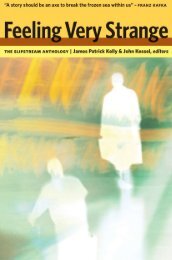The Curse of the Wer.. - Site de Thomas - Free
The Curse of the Wer.. - Site de Thomas - Free
The Curse of the Wer.. - Site de Thomas - Free
Create successful ePaper yourself
Turn your PDF publications into a flip-book with our unique Google optimized e-Paper software.
WEREWOLVES AND SCHOLARS<br />
<strong>The</strong> <strong>de</strong>velopment <strong>of</strong> <strong>the</strong> field <strong>of</strong> folklore research can illustrate<br />
<strong>the</strong> shifts in textual authority that occurred as a result <strong>of</strong> changes in<br />
writing practice related to <strong>the</strong> growth <strong>of</strong> <strong>the</strong> universities. Many <strong>of</strong> <strong>the</strong><br />
works that built <strong>the</strong> discipline contained sections on lycanthropy, and<br />
<strong>the</strong> use <strong>of</strong> language and <strong>the</strong>mes in <strong>the</strong>se passages chronicles <strong>the</strong> birth<br />
<strong>of</strong> <strong>the</strong> mo<strong>de</strong>rn disciplines <strong>of</strong> anthropology, comparative literature and<br />
linguistics. <strong>The</strong> early folklorists were ‘literati’ or ‘men <strong>of</strong> letters’, and<br />
were influenced by <strong>the</strong> lyricism <strong>of</strong> <strong>the</strong> romantics. As <strong>the</strong> philosophy <strong>of</strong><br />
science gained cre<strong>de</strong>nce, however, folklorists sought to orientate <strong>the</strong>ir<br />
work within an increasingly scientific framework. In his Preface to<br />
Choice Notes from ‘Notes and Queries’: Folk Lore (1858) — a selection<br />
<strong>of</strong> work from <strong>the</strong> journal in which <strong>the</strong> methodology <strong>of</strong> folklore research<br />
was largely elaborated — William Thoms expressed <strong>the</strong> hope that ‘<strong>the</strong><br />
study <strong>of</strong> folklore would rise from a pleasant pastime to a science’. 62<br />
<strong>The</strong> <strong>de</strong>velopment <strong>of</strong> folklore research from a ‘pleasant pastime’<br />
into a ‘science’ can be traced through <strong>the</strong> literature on lycanthropy.<br />
Although knowledge <strong>of</strong> ancient werewolf myths and <strong>the</strong> early-mo<strong>de</strong>rn<br />
werewolf trials was already well established by <strong>the</strong> 1830s, relatively<br />
little information about <strong>the</strong> werewolf in folk-tale traditions or mythological<br />
systems o<strong>the</strong>r than those <strong>of</strong> Greece and Rome had been collected.<br />
In 1843, for example, an article in <strong>the</strong> Anglo-American could<br />
only state:<br />
<strong>The</strong> wolf is an animal well known on our continent. But he is only known<br />
in his natural shape and condition. In Europe, on <strong>the</strong> contrary, <strong>the</strong><br />
inhabitants <strong>of</strong> those countries, in which he abounds, have been in <strong>the</strong><br />
habit <strong>of</strong> supposing that <strong>the</strong> fiercest wolves are men, transformed by magic<br />
into that shape for <strong>the</strong> purpose <strong>of</strong> <strong>de</strong>vouring <strong>the</strong>ir fellows, or, at least,<br />
<strong>the</strong>ir flocks and herds. 63<br />
<strong>The</strong> author won<strong>de</strong>red about <strong>the</strong> occurrence <strong>of</strong> lycanthropy in ‘<strong>the</strong><br />
interior parts <strong>of</strong> Asia’, stating that it would ‘be <strong>de</strong>sirable, if any one,<br />
conversant with <strong>the</strong>ir opinions and habits, would make it known to us,<br />
whe<strong>the</strong>r any, and what, similar i<strong>de</strong>as are to be found among those savage<br />
communities. Any such communication would be gladly inserted.’ 64 By<br />
1846, <strong>the</strong> term ‘folk-lore’ had been coined in <strong>the</strong> journal A<strong>the</strong>naeum,<br />
and interest in <strong>the</strong> subject was expanding rapidly, but until about<br />
31





